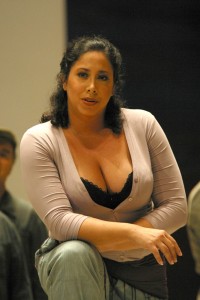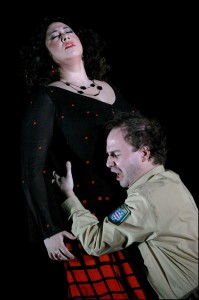A conversation with mezzo-soprano Nadine Weissmann: “Suddenly I realized – this is my voice”

She is a native Berliner with dual citizenship – English and German – and she speaks four languages – German, English, French, and the language of song. Nadine Weissmann, a young mezzo-soprano, leads an international lifestyle. On the one hand, it comes with the job. Anyone who wants to make it as an opera singer has to be present in the world’s music centers. That means participating in competitions, performing at festivals, and always being ready for the call to perform on a stage anywhere in the world, whether in Glyndebourne, Weimar, Barcelona or Bayreuth.
On the other hand, Nadine Weissmann was practically born with extra pages in her passport. Her parents and grandparents are Romanian Jews from Bucharest and the former Austro-Hungarian cultural metropolis Czernowitz (Chernivtsi), which was once the center of German-Romanian Bukovina, the home of the legendary tenor Joseph Schmidt. The latter was a cantor at the main Synagogue in Czernowitz before he launched his global career, in the late 1920s in Berlin, as a singer of classic roles. In 1933, Schmidt had to fl ee Germany. He died tragically in an internment camp in Switzerland in 1942. Today, the Berliner Nadine Weissmann says her paternal grandmother, Alma Wagner, was one of Joseph Schmidt’s voice students in Czernowitz. And so it comes full circle.
Judaism is a part of me
Nadine Weissmann has no doubt that she belongs in Berlin. After all, she was born here. “This is my home,” she says, calmly and casually. For her parents, it was not that simple. The family’s path to Berlin included stations in the ghetto and work camps, witnessing murder and enduring fl ight, and expulsion. “I was very lucky,” says Weissmann, considering the political upheaval and crimes of the past century, “that I grew up with all four of my grandparents.” Her mother’s family left communist Romania in 1959 and settled in Bristol, England. Her father, Eduard Weissmann, emigrated with his parents to Düsseldorf in the early 1960s. After graduating from the University of Music in Cologne, he joined the RIAS Symphony Orchestra in Berlin (now Deutsches Symphonieorchester) as a cellist when the city was still divided into East and West by a wall. It was his fi rst job as an orchestra musician, and he remained there until he retired. When he proposed to Gabriele, the love of his life, whom he had met in Romania, she packed her bags and moved from England to Germany. That was about 40 years ago. Has Berlin also become her parents’ home? “They will probably never feel that they belong 100 percent in this beautiful city,” says their daughter.
A Jewish woman in Berlin. For Nadine Weissmann that was just an everyday fact, nothing special. Of course, she went to the Jewish kindergarten. It took her a while to realize that not every kindergarten in the city is guarded by the police. Of her family, she says, “We are a very secular household, but we visit the synagogue on the high holidays and travel to Israel on a somewhat regular basis. Judaism is more of a cultural and spiritual identity for me than a religion. Still, it will always be a part of me. Growing up in a family that speaks so many different languages and comes from so many different countries really shaped me.”
A revelation
 Nadine Weissmann went to the bilingual John F. Kennedy School and grew up speaking German and English. Her friends were there, and even as a little girl she had plenty of opportunities to participate in her favorite activities – singing and acting. Visiting her grandparents once in England, she saw the fi lm “Funny Girl.” “I knew that someday I wanted to do what Barbra Streisand was doing on that screen,” she says. When she made this decision, Nadine Weissmann was just fi ve years old – but she has stayed the course. She never completely ruled out the musicals genre, at least in the early years of her career.
Nadine Weissmann went to the bilingual John F. Kennedy School and grew up speaking German and English. Her friends were there, and even as a little girl she had plenty of opportunities to participate in her favorite activities – singing and acting. Visiting her grandparents once in England, she saw the fi lm “Funny Girl.” “I knew that someday I wanted to do what Barbra Streisand was doing on that screen,” she says. When she made this decision, Nadine Weissmann was just fi ve years old – but she has stayed the course. She never completely ruled out the musicals genre, at least in the early years of her career.
Since she didn’t want to submit to the kind of compartmentalized thinking that persisted in the cultural sphere in Germany, she went to London after high school to train as a singer. At that time, she, along with everyone else, believed she was a soprano. After her graduation four years later, she left for the United States to earn a Master’s degree in opera singing at the University of Indiana in Bloomington. The music school there is considered an exemplary modern institute, with a stage and auditorium modeled on that of the Metropolitan Opera in New York. The students in Bloomington produce eight operas per year. Weissmann studied with Virginia Zeani, an opera singer who also happened to come from Romania. During their second lesson, she told Weissmann that she was not a soprano, but a mezzo-soprano. It was like a revelation, she says, “A stone dropped from my heart. She taught me everything over again, starting from the beginning. Finally, I was singing the sound that I always suspected was inside of me. Suddenly I knew – this is my voice.” The discovery opened up a whole new repertoire for the young singer. “These roles, these fabulous, spirited personae, were so much more me than the soprano roles, eternally loving and suffering on the stage, and then of course dying. Weissmann was much more attuned to enigmatic, passionate, and sometimes dark women like Carmen, the role she sang in her fi rst engagement at the Osnabrück Theater. “Returning home after my studies was the right thing to do, because the opera scene in Europe and especially in Germany is much more alive than that in the United States.” She remained in Osnabrück for two-and-a-half years after her debut there. At the time, only fi ve Jews lived in the northern German city, after the ravages of the war and Nazi rule. Today, there are nearly 1100, and Jewish life is once again present in Osnabrück.
Weissman’s years at a theater that presents opera, operettas, musicals, drama, and ballet was a time for learning and trying out new things, where she had the opportunity to conquer her fi rst roles without too much scrutiny. And she learned all too quickly what was good for her voice and what was not. Of the three our four different roles she would sing each week, mastering 13 roles in twoand- a-half years, Weissman says, “you are just happy to survive that as a singer. I’ve always trusted my instinct to leave when the time comes,” she says. She left in 2004.
Booked for Wagner
The Nationaltheater in Weimar was an important stepping-stone in Weissman’s career. Weimar is world-famous as the city of Goethe, and it is still brimming with culture and an international fl air. Here, Weissmann had her first encounter with Richard Wagner. “I never would have thought,” she admits, “that Wagner would one day play such a major role in my career as a singer.” In 2006, she was engaged for the entire Ring cycle in Weimar. “The ‘Ring’ was one of the most unbelievable experiences of my life,” she admits. She played Erda in “Rheingold,” a Valkyrie, Erda in “Siegfried” and Waltraute in “Götterdämmerung.” Does it get any better for a singer? The staging in Weimar was filmed for Arthaus and a DVD version went “a bit” global, according to Weissmann.
She has since bid farewell to Weimar, but the “Ring” has stayed with her. Barcelona is coming up, and the Wagner Festival in Bayreuth has booked her for its new “Ring” in 2013. Kirill Petrenko, the Maestro renowned all over the world and future Music Director of the Bavarian State Opera, will conduct. Nadine Weissman is already very excited about next summer: “A Jewish girl from Berlin singing in Bayreuth for a Jewish conductor … now that’s really something.”
